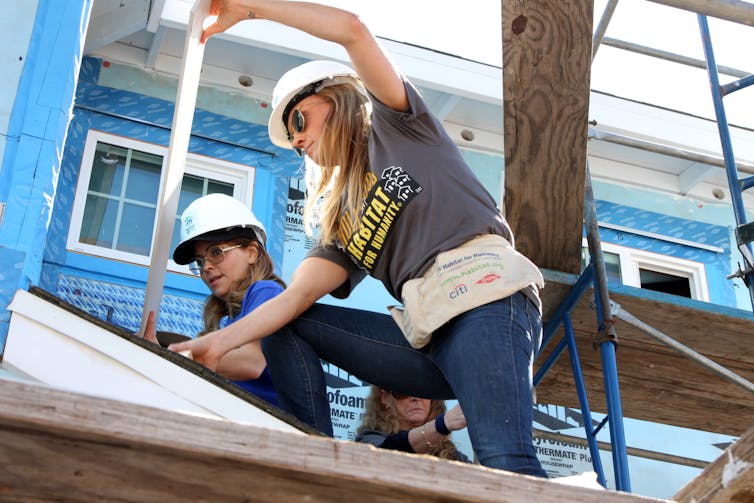Connecting state and local government leaders
In college towns, student volunteers may make up a disproportionate percentage of the total volunteers.
Millions of college students volunteer at soup kitchens, animal shelters and other nonprofits near where they go to school. The arrangement gives these young adults valuable experience that can help them launch their careers while giving charities a hand.
As a professor who studies nonprofits, I’m interested in the effects student volunteers have on the local nonprofit sector. Having recently moved from San Diego, California, to Gainesville, Florida, I was particularly interested in the effect of students in a small college town.
For comparison purposes, San Diego has multiple universities as well as multiple strong industries, including biotechnology, telecommunications and military bases. Gainesville has a large university and a community college that dominate its economy. Intrigued by the differences, I wondered whether student volunteers were more of a burden or a boon to local nonprofits in the smaller college town.
Gainesville, Florida
To find out, I partnered with Elaine Giles, director of the University of Florida Brown Center for Leadership and Service, which encourages volunteerism among students through community service projects, and Emily Carroll, at the time a college student.
We surveyed 55 Gainesville nonprofit leaders to identify their capacity to manage student volunteers, their experience of student volunteers, and what colleges and universities could do to improve the impact of student volunteers in the community.
About half of Gainesville’s approximately 131,000 inhabitants are students enrolled at University of Florida and Santa Fe College.
As we explained in an article we published in the Journal of Service-Learning in Higher Education, we found there is a real cost to nonprofits of student volunteers. And, in college towns, student volunteers may make up a disproportionate percentage of the total volunteers. Ultimately, students are not having as much impact in the community as is possible.
This means that, in college towns, there are inefficiencies in the volunteer labor system that result in lost potential for students, nonprofits and ultimately local communities.

Managing Volunteers
First, we found that most participating organizations hadn’t taken many steps to actively manage their volunteers. Fifty-six percent of these groups employed paid volunteer administrators, but in most cases these staffers were part-time. Only three – 8% of these organizations – had full-time paid volunteer administrators.
Most people with this kind of job had additional responsibilities. Very few had formal training in volunteer management.
The nonprofits engaged in some best practices. For example, 74% indicated they regularly supervised and communicated with volunteers and 72% regularly collected information on how many hours volunteers put in. However, only 48% had strong screening practices, only 44% conducted background checks, and only 28% provided regular training and professional development opportunities to volunteers.
Promise and Challenges
We found that students were indeed a major source of volunteer support for local nonprofits. On average, students comprised more than half of the participants’ pool of volunteers. In some organizations, students comprised more than three-quarters of the pool.
These groups told us that they benefited from the labor support, enthusiasm, passion and creativity they got from student volunteers, as well as help with marketing and exposure, particularly on campus, and technological expertise.
However, the promise of these benefits was uneven at best.
We heard from many nonprofits that students tended to volunteer in the areas immediately surrounding their campus, with fewer students willing or able to make the trek out to the more remote – and sometimes more-in-need – areas of town.
Organizations also reported that students’ schedules could be at odds with when they needed a hand. Students are often unavailable during summers or holidays, and their academic schedules often meant shoehorning volunteer service into unreasonably small chunks of time, such as during a three-hour opening between classes.
Additionally, students often wanted to volunteer for a week or a semester, rather than make a long-term commitment to an organization. These sorts of challenges increased costly volunteer turnover and decreased the likelihood of individual students making a lasting impact.
Finally, nonprofits reported that while students generally had the skills that they needed to be effective volunteers, they didn’t always do enough research prior to volunteering and many did not follow through on their commitments. Further, they found that the students sometimes weren’t aware of basic workplace etiquette, like being prompt and dressing appropriately, and didn’t always take initiative as their managers would like.
Better Understandings
I believe that nonprofits in college towns can get more from the students volunteers and that the students could benefit more from the experience if each side had a better understanding of what the other needs and made a bigger effort to accommodate those needs.
Nonprofits can change the way they recruit to encourage long-term volunteering and screen out those students who perhaps just want to pad their resumes. These organizations can also improve how they train their young volunteers. And nonprofits can become more flexible about volunteer opportunities and do more to recognize the contributions of their student volunteers.
Colleges and universities can provide more recruitment opportunities such as volunteer fairs, college-supported online volunteer portals and special events.
Colleges and departments can create service awards that recognize not just the number of hours a student has served across multiple organizations, but the longevity of service to specific organizations.
Faculty members whose students engage in service learning – curriculum-based learning activities that benefit the community in some way – can meet individually with organizations to better understand their needs, and then coach students in responding to those needs. And student volunteers can encourage their peers to pitch in too.
This article is republished from The Conversation under a Creative Commons license. Read the original article.
Jennifer A. Jones is an assistant professor of nonprofit management and leadership at the University of Florida.

NEXT STORY: Getting Older, Going Broke: Who’s Going to Pay for Long-Term Care?



